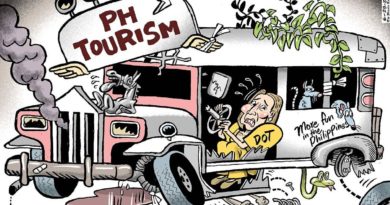COLUMNISTS: PUBLIC LIVES- Revolutionary Government and the crisis of succession
It is strange that the idea of a RevGov (revolutionary government) has resurfaced on the day set aside for the remembrance of the August 21st murder of Benigno “Ninoy” Aquino 37 years ago. This uncanny coincidence brings back unpleasant memories of a period when our country seemed destined to become Asia’s banana republic—violent, unstable, the unhappy playground of coup plotters and political adventurers.
.


In a letter recently circulated on social media, the organizers of what is being billed as a “People’s Coalition for Revolutionary Government and Charter Change” are seeking a meeting with Philippine National Police chief Archie Gamboa, purportedly to secure clearance for a series of planned activities. The letter is signed by Bobby Brillante, “National Coordinator for Revolutionary Government Committee,” and by lawyer Francisco “Arlene” Buan, “National Spokesperson, MRRD-NECC.” The initials stand for “Mayor Rodrigo Roa Duterte National Executive Coordinating Committee.”
The letter appeals to President Duterte “to head the said revolutionary government under a revolutionary constitution to last until Dec. 31, 2021 after which election shall be held under the newly amended constitution as a fundamental law of the land in a Federal form of government.” Shorn of verbiage, this brash incitement to commit an unlawful act is asking Mr. Duterte to mount a coup against the government he heads by junking the 1987 Constitution under which he was elected.
Further on, the letter states: “The principal objective of pursuing a revolutionary government through peaceful and non-violent means is to bring about a change that we, and then candidate Mayor Duterte promised during the 2016 presidential campaign to establish law and order, public safety, equal opportunity in public service, social justice and economic freedom.”
.
In an interview with CNN Philippines, Brillante, a politician from Makati, confirms the veracity of the letter and offers an explanation for this resurrected initiative. “Considering that we only have about one and a half years remaining, it seems that the promised changes, including the Constitutional amendment leading to federalism, do not have enough time to be enacted.” Fascinating.
We might recall that the first time RevGov was floated in the early months of the Duterte presidency, it was all about the need to radically dismantle the existing political order in order to pave the way for genuine societal change. Its emblem was the shift to federalism. For some reason, this idea never gained traction among Mr. Duterte’s own followers.
Still, RevGov retained its ominous ring. Mr. Duterte himself brandished it like a weapon he threatened to use if he did not get the leeway he sought from the other branches of government. Today, my sense is that some quarters are pushing it not so much to install federalism by shortcut as to manage a crisis of succession in the face of Mr. Duterte’s rumored declining health.
Technically, there should not be any succession crisis. We have a duly-elected vice president who is mandated by the Constitution to assume the presidency in the event of a vacancy or the incapacity of the incumbent to discharge the responsibilities of the office. It is clear that some people would do anything to eliminate Vice President Leni Robredo from the line of succession.
A crisis of succession was very much in the air in 1983, when Ninoy Aquino decided to come home from exile in the United States. Marcos was rumored to be dying from a kidney transplant that did not go well. He would at times disappear from public view for long stretches. To satisfy the recurrent demand for proof of life, he would suddenly reappear, visibly groggy from the effects of medication, but trying hard to strike a snappy pose. None of the individuals who were rumored to succeed him — Prime Minister Cesar Virata, First Lady Imelda Marcos, Defense Minister Juan Ponce Enrile, Armed Forces chief Fabian Ver — commanded as much personal authority as the ailing Ferdinand Marcos.
The emerging picture then was that of a dictator who, because of a debilitating illness, was fast losing control of government. The consensus was that his looming exit could trigger a civil war. The military leadership was divided, the underground communist movement had gained unprecedented strength, the anti-Marcos political opposition was hopelessly splintered, and there seemed no one credible and popular enough to lead the country toward a peaceful transition to democracy.
This was the situation in which Ninoy thought he could intervene. Despite the fact that he was kept in the dictator’s prisons for more than seven years, he planned to talk to Marcos, appeal to his love of country, and get his assurance that he would not stop the nation’s nonviolent return to democracy. As naïve as it might sound, the key event for him that would pave this transition was the parliamentary election of 1984. He planned to participate in that election as the leader of a unified opposition.
.


But history took a different turn. Ninoy was murdered in broad daylight as soon as he stepped out of his plane. His death sparked a nonviolent movement for democratic change that coalesced around his widow, Cory Aquino, and culminated in the 1986 Edsa uprising that ousted the Marcos regime.
A reminder to the advocates of RevGov: You can’t breathe new life to a tyranny that is drowning in its own corruption and incompetence. You can’t throw away an existing constitution without the explicit approval of the people and the tacit consent of the military.
.


SIGN UP TO RECEIVE OUR EMAIL
.
The most important news of the day about the ASEAN Countries and the world in one email: [email protected]
8.24.2020










